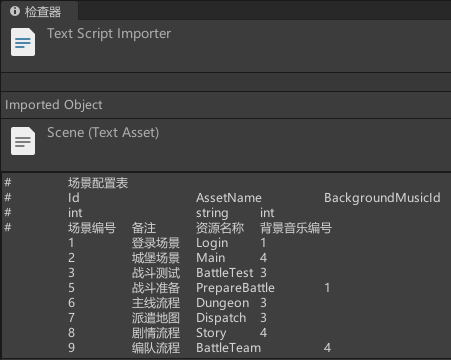1
2
3
4
5
6
7
8
9
10
11
12
13
14
15
16
17
18
19
20
21
22
23
24
25
26
27
28
29
30
31
32
33
34
35
36
37
38
39
40
41
42
43
44
45
46
47
48
49
50
51
52
53
54
55
56
57
58
59
60
61
62
63
64
65
66
67
68
69
70
71
72
73
74
75
76
77
78
79
80
81
82
83
84
85
86
87
88
89
90
91
92
93
94
95
96
97
98
99
100
101
102
103
104
105
106
107
108
109
110
111
112
113
114
115
116
117
118
119
120
121
122
123
124
125
126
127
128
129
130
131
132
133
134
135
136
137
138
139
140
141
142
| using GameFramework.DataTable;
using GameFramework.Event;
using UnityEngine;
using UnityGameFramework.Runtime;
using ProcedureOwner = GameFramework.Fsm.IFsm<GameFramework.Procedure.IProcedureManager>;
namespace YouProject {
public class ProcedureChangeScene : ProcedureBase
{
private const int MenuSceneId = 1;
private bool m_IsSceneLoadComplete = false;
private int m_BackgroundMusicId = 0;
private int sceneId = 0;
protected override void OnEnter(ProcedureOwner procedureOwner)
{
base.OnEnter(procedureOwner);
m_IsSceneLoadComplete = false;
GameEntry.Event.Subscribe(LoadSceneSuccessEventArgs.EventId, OnLoadSceneSuccess);
GameEntry.Event.Subscribe(LoadSceneFailureEventArgs.EventId, OnLoadSceneFailure);
GameEntry.Event.Subscribe(LoadSceneUpdateEventArgs.EventId, OnLoadSceneUpdate);
GameEntry.Sound.StopAllLoadingSounds();
GameEntry.Sound.StopAllLoadedSounds();
GameEntry.Entity.HideAllLoadingEntities();
GameEntry.Entity.HideAllLoadedEntities();
string[] loadedSceneAssetNames = GameEntry.Scene.GetLoadedSceneAssetNames();
for (int i = 0; i < loadedSceneAssetNames.Length; i++)
{
Debug.Log("loadedSceneAssetNames: " + loadedSceneAssetNames[i]);
GameEntry.Scene.UnloadScene(loadedSceneAssetNames[i]);
}
GameEntry.Base.ResetNormalGameSpeed();
sceneId = procedureOwner.GetData<VarInt>("NextSceneId");
IDataTable<DRScene> dtScene = GameEntry.DataTable.GetDataTable<DRScene>();
DRScene drScene = dtScene.GetDataRow(sceneId);
if (drScene == null)
{
Log.Warning("Can not load scene '{0}' from data table.", sceneId.ToString());
return;
}
GameEntry.Scene.LoadScene(AssetUtility.GetSceneAsset(drScene.AssetName), Constant.AssetPriority.SceneAsset, this);
m_BackgroundMusicId = drScene.BackgroundMusicId;
}
protected override void OnLeave(ProcedureOwner procedureOwner, bool isShutdown) {
GameEntry.Event.Unsubscribe(LoadSceneSuccessEventArgs.EventId, OnLoadSceneSuccess);
GameEntry.Event.Unsubscribe(LoadSceneFailureEventArgs.EventId, OnLoadSceneFailure);
GameEntry.Event.Unsubscribe(LoadSceneUpdateEventArgs.EventId, OnLoadSceneUpdate);
GameEntry.Event.Unsubscribe(LoadSceneDependencyAssetEventArgs.EventId, OnLoadSceneDependencyAsset);
base.OnLeave(procedureOwner, isShutdown);
}
protected override void OnUpdate(ProcedureOwner procedureOwner, float elapseSeconds, float realElapseSeconds)
{
base.OnUpdate(procedureOwner, elapseSeconds, realElapseSeconds);
if (!m_IsSceneLoadComplete)
return;
switch (sceneId)
{
case 1:
ChangeState<ProcedureLogin>(procedureOwner);
break;
case 2:
ChangeState<ProcedureMain>(procedureOwner);
break;
case 3:
ChangeState<ProcedureBattle>(procedureOwner);
break;
default:
break;
}
}
private void OnLoadSceneSuccess(object sender, GameEventArgs e)
{
LoadSceneSuccessEventArgs ne = (LoadSceneSuccessEventArgs)e;
if (ne.UserData != this)
return;
Log.Info("Load scene '{0}' OK.", ne.SceneAssetName);
if (m_BackgroundMusicId > 0)
GameEntry.Sound.PlayMusic(m_BackgroundMusicId);
m_IsChangeSceneComplete = true;
}
private void OnLoadSceneFailure(object sender, GameEventArgs e)
{
LoadSceneFailureEventArgs ne = (LoadSceneFailureEventArgs)e;
if (ne.UserData != this)
return;
Log.Error("Load scene '{0}' failure, error message '{1}'.", ne.SceneAssetName, ne.ErrorMessage);
}
private void OnLoadSceneUpdate(object sender, GameEventArgs e)
{
LoadSceneUpdateEventArgs ne = (LoadSceneUpdateEventArgs)e;
if (ne.UserData != this)
return;
Log.Info("Load scene '{0}' update, progress '{1}'.", ne.SceneAssetName, ne.Progress.ToString("P2"));
}
private void OnLoadSceneDependencyAsset(object sender, GameEventArgs e)
{
LoadSceneDependencyAssetEventArgs ne = (LoadSceneDependencyAssetEventArgs)e;
if (ne.UserData != this)
return;
Log.Info("Load scene '{0}' dependency asset '{1}', count '{2}/{3}'.", ne.SceneAssetName, ne.DependencyAssetName, ne.LoadedCount.ToString(), ne.TotalCount.ToString());
}
}
}
|
